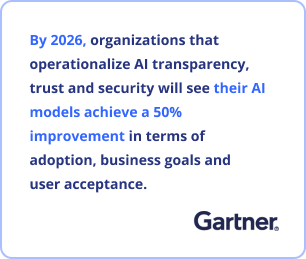As technologies like Artificial Intelligence continue to advance and become more intertwined with our daily lives, they bring ethical, social, security, and privacy challenges that require regulations and guidelines to minimize the risks associated with their implementation.
Beyond regulation, it is essential to not only adhere to established norms but also to embrace ethical and transparent practices within society and businesses. AI developers must meticulously consider the impact of their decisions on individual and collective rights when creating AI algorithms.
Here are three steps that governments, businesses, and individuals can and should take to foster a secure and regulated Artificial Intelligence ecosystem.
Regulation as first step
The European Union has recently achieved a significant milestone by becoming the world’s first region to implement a comprehensive law to regulate AI. This law aims to ensure that AI systems used within the EU are safe, transparent, traceable, non-discriminatory, environmentally friendly, and overseen by humans rather than automated systems. Additionally, the legislation introduces a dual-level approach: it mandates transparency for all general-use AI models and imposes even stricter requirements for “high-risk” models.
The recent initiative from the European Union represents a positive step forward, yet global action is essential to effectively address emerging challenges. While there is an agreement on the necessity of AI regulation, determining specific global approaches remains undetermined.
With AI technologies advancing rapidly, it’s crucial for legal frameworks, ethical guidelines, and corresponding industrial practices to evolve swiftly to meet these challenges.
Risk mitigation as second step
Developers and companies should implement strong security practices, as well as anonymization and encryption techniques, to safeguard user data and ensure the integrity and confidentiality of information.

The potential disclosure of sensitive information remains a major concern in using and advancing AI platforms. This technology’s ability to access sensitive details such as location, preferences, and habits poses risks of unauthorized data exposure.
For example, inadvertent disclosure of confidential data in responses could lead to unauthorized access, privacy breaches, and security violations. Additionally, data used to train LLM models might inadvertently reveal personal information, API keys, secrets, and more.
To mitigate these risks, it’s crucial for companies to embed privacy principles into the design phase of AI solutions, comply with local and international regulations, and actively engage in industry initiatives. These steps can help build a solid foundation of trust in AI technology while safeguarding against potential vulnerabilities.
Commitment as third step
Besides regulation and technical measures, education and awareness play a crucial role in fostering responsible use of AI. Active commitment from all stakeholders involved in AI development and deployment is essential to establish a secure and regulated ecosystem
The effectiveness of generative AI in cybersecurity or any other application relies on the collaboration between technology and human teams. While AI excels in analyzing information and detecting threats, it must be complemented by human interpretation and decision-making capabilities.
At inConcert, as providers of technological solutions, we uphold a steadfast commitment to ensuring the security of our technology, operations, and data, meeting the highest standards. This dedication fuels ongoing development, partnerships, and investments in security tools, enabling us to stay ahead of emerging threats.
For example, during generative AI training, we prioritize safeguarding and anonymizing data to prevent vulnerabilities to threats and attacks, and to avoid accidental or malicious data leaks. In addition to maintaining multiple certifications and adopting best practices, we uphold the highest security standards to ensure data integrity and confidentiality.
While we are just starting this conversation, we can already promote regulation, collaboration, and commitment in both our personal and professional lives. Is it possible to envision a future where we responsibly leverage the potential benefits of AI while steadfastly protecting people’s fundamental right to privacy?




